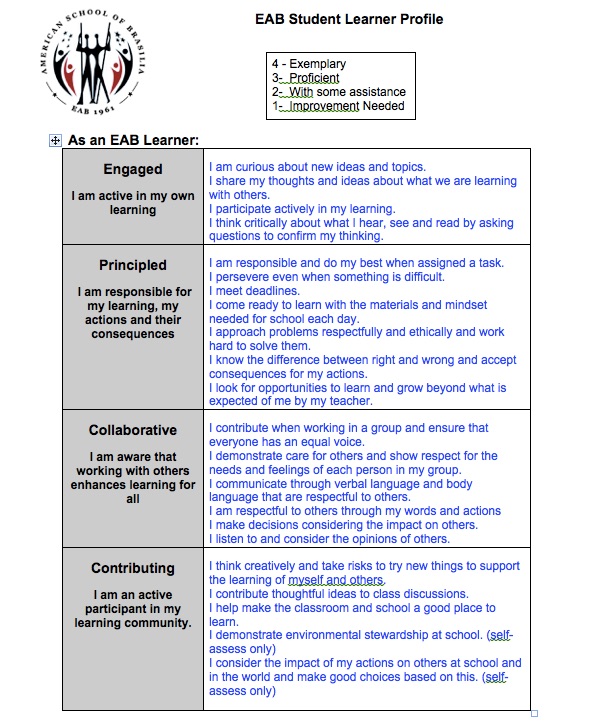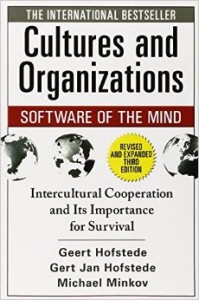The most moving and important testimonials about learning and school culture also come from parents, whose voices are critical to our collective partnership in support of student development. To complement last week’s post, Our Obligation, which focused on inclusion from a student’s perspective, this post shares a poignant parent reflection on the same theme.
Alex Ellis is currently serving as the British Ambassador to Brazil. Following his son Thomás’ recent graduation from the American School of Brasilia, Ambassador Ellis published the following reflections, which focus on the culture of learning and inclusion in schools.
Tomás Finished School Last Saturday
There are parents all over the northern hemisphere who in these weeks have watched or will watch their child go through this ritual, in many different forms, in the case of our son through a flick of a tassel. Each family has its own memories and stories, both similar to those of others and peculiar to themselves.
Our story includes a moment, at an earlier time, spent in a still, grey room, with sensible Flemish doctors telling us in sensible, Flemish English that our son is on the autistic spectrum. There’s no number to confirm this, no blood test. It’s the product of observation and judgment, and that knot of anxiety which has sat inside our stomachs from when Tomas’ first kindergarten teacher wondered if he might be a bit different, the apparent difficulty in hearing (tested, unproven), his slightly awkward walk, his focus on a few toys but not his classmates.
Before he was diagnosed Tomás passed through a series of small schools, mainly with the help of kind teachers, next to whom he was often standing. The diagnosis came after, at very short notice, we had moved from warm, fun Madrid back to Brussels. He plunged into a large school which quickly declared him “ineducable”. It doesn’t sound much nicer when you hear it in French. Which I did, twice, for bureaucratic reasons which were legally impeccable, financially advantageous and inhuman.
I wondered, when Tomas was diagnosed, what would happen next. “Tomorrow” is the best answer. He hadn’t changed and we hadn’t changed. We fell, and then got up. Tomas carried on, much happier at a school that took him, rather than rejected him, for who he is. The labels — Asperger’s, on the autistic spectrum, he’s quite bright but different etc — helped in the first interaction with schools. They were ready to adjust before he walked in.
Tomas got from there to here, 11 years later, because of some things he was born with; confidence, a sense of humour and a good heart. Lots of other children have those characteristics, autistic or not. Tomas had a lot of help as well. Help in the form of classroom support, and crucially from teachers who “got” him. Who saw him as different, not special, as a person, albeit in teenage form, rather than a syndrome.
This, we learnt, starts at the top. Schools are no different from any other organisation in the importance of the leader in determining and living its values. We had luck, and a bit of choice, in the two schools where Tomas spent the best part of a decade. Both heads thought that a school would gain more than lose from a boy like Tomas in it, that this was part of the world of difference in which pupils should learn. Almost without exception the pupils shared this attitude. On a rare occasion when a classmate tried to bully him, his confidence and humour dealt pretty comfortably with it.
The head teacher at the ambitious, academic school where Tomas stayed longest told me, after chatting with him, that he would take him into the school, but there would be some who wouldn’t be so keen to have him there. So it proved. Some teachers welcomed him, some wanted him out of their class. This wasn’t determined by Tomas’ abilities, but by the teacher’s confidence. Over time some teachers excluded him from classes in which he was relatively strong, whilst others kept with him in subjects (maths) in which threats, tears and bribes could not move him — I know, having tried, and failed, with all three. As exams loomed bigger, some teachers, and in rare cases some other parents, wanted Tomas out of the class for fear that he might undermine the grades of other pupils. In such situations the real values of a school become apparent.
Tomas is not easy to teach. Like a lot of kids on the autistic spectrum, he’s pretty autodidactic (and I should thank The Simpsons, Futurama and Cartoon Network for their significant contribution to his education). And he tells it as he sees it, which can be uncomfortable. The new music teacher in one school, fresh from university, might have hoped for a different opening to his career than Tomas asking to see his qualifications.
But the good teachers, and there were a lot of them, got past this or better still embraced this as part of what Tomas brought to the classroom, to the school — and also knew that the second is a lot ore than just the first. Last week, after Tomás stepped up to get an arts prize, to his father’s bursting pride and his own mild indifference, a teacher referred to the support for him from “the school community”. She was quite right. It did, for our son, take just that community to help get him through his education.
So this one goes out, yes, to the son I love. But it also goes out to every member of those school communities, teachers, administrators, security guards, classroom helpers, who saw in Tomas not a potential spoiler of grade averages or a “special” pupil to be kept in a “special” place but rather saw him for what he was — another flavour in the very wide variety that is the human race.
Link to Original Post: Tomás Finished School Last Saturday
Versão português:
Nossa Tapeçaria Humana
Os depoimentos mais emocionantes e importantes sobre a aprendizagem e cultura escolar também vêm dos pais, cujas vozes são fundamentais para a nossa parceria em prol do desenvolvimento do aluno. Complementando a postagem da semana passada, A Nossa Obrigação, cujo foco foi a inclusão de acordo com a perspectiva de cada aluno, a publicação abaixo compartilha a reflexão comovente de um pai sobre o mesmo tema. Alex Ellis está servindo atualmente como Embaixador Britânico no Brasil. Logo após a formatura do seu filho Thomas, na Escola Americana de Brasília, o Embaixador Ellis publicou a seguinte reflexão, que incide sobre a cultura de aprendizagem e inclusão nas escolas.
Tomás terminou a escola no último Sábado
Nessas últimas semanas, pais em todo o hemisfério norte foram ou vão assistir seus filhos passarem por esse ritual, de formatura, nas mais diversas formas; como no caso do nosso filho Tomás que passou a corda do capelo do lado direito para o lado esquerdo. Cada família tem suas próprias memórias e histórias, algumas semelhantes entre si — e outras completamente particulares.
Nossa história inclui um momento vivido alguns anos atrás, em uma sala ainda cinzenta, com sensíveis médicos da região belga dos Flandres nos dizendo, também de forma sensível, que nosso filho possuía um diagnóstico de espectro autista. Não há nenhum número para confirmar isso; nenhum exame de sangue. Essa conclusão é o produto único de observação e julgamento. É resultado daquele nó de ansiedade que tomou conta de nós, eu e minha esposa, quando a primeira professora de Tomás, no jardim de infância, nos chamou na escola e nos perguntou se ele era um pouco diferente; desde sua aparente dificuldade de audição (testada e não comprovada); ao caminhar um pouco desajeitado e o foco em alguns brinquedos, mas não seus colegas.
Antes de ser diagnosticado, Tomás passou por uma série de pequenas escolas, sempre com a ajuda de professores amáveis, dos quais ele quase sempre permanecia por perto. A comprovação veio logo depois que nos mudamos da quente e divertida Madrid de volta à Bruxelas, na Bélgica. Ali, Tomás foi matriculado em uma escola maior, que rapidamente o declarou como “ineducável”. Uma frase que não soa muito mais agradável quando você a escuta em francês.
Eu me perguntava, assim que ele foi diagnosticado, o que aconteceria em seguida. E o “amanhã” é a melhor resposta. Meu filho, assim como nós, não tinha mudado. Nós caímos, mas então nos levantamos. Tomás seguiu em frente, muito mais feliz em uma escola que o acolheu ao invés de rejeitá-lo por ser quem ele é. Os rótulos — Asperger, com espectro autista, “muito brilhante, mas diferente”… — ajudaram em sua primeira interação com as novas escolas. Elas estavam prontas a se adaptarem antes da nossa chegada.
Nesses últimos 11 anos, como fruto de várias características de sua natureza, Tomás adquiriu confiança, um excelente senso de humor e um bom coração.
Várias outras crianças também são assim — autistas ou não. Tomas também recebeu muita ajuda. Ajuda em forma de suporte com as atividades em sala de aula e, crucialmente, de professores que o conquistaram. Professores que o enxergaram como diferente, e não especial; como uma pessoa, ainda que adolescente, ao invés de uma síndrome.
Nós aprendemos algo desde o começo: escolas não são diferentes de qualquer outra organização no que se refere à importância de um líder que determine e estimule determinados valores. Tivemos sorte, e um pouco de escolha, com as duas escolas onde Tomás passou a maior da última década.Ambas as partes acreditaram que a escola iria ganhar mais do que perder recebendo um garoto como ele, parte de um mundo de diferenças que todos os demais alunos deveriam aprender. Quase sem exceção, todos os demais alunos compartilharam essa atitude. E na rara ocasião em que um colega tentou intimidá-lo, a confiança e o bom humor de Tomás lidaram confortavelmente com a situação.
O diretor da escola em que Tomás ficou a maior parte de sua trajetória me disse, depois de conversar com ele, que iria matriculá-lo, mas confessou que haveria algumas pessoas ali pouco ansiosas com a sua chegada. E assim foi. Alguns professores o acolheram, alguns o queriam fora de sala. Isso não foi determinado pela capacidade de Tomás, mas pela confiança de cada um dos professores. Ao longo do tempo, alguns professores o excluíram de aulas nas quais ele era relativamente habilidoso, enquanto outros continuaram com ele em disciplinas (matemática, por exemplo) em que as ameaças, as lágrimas e os subornos não conseguiam movê-lo. A medida que os exames foram aumentando, alguns professores e, em raros casos, alguns pais, queriam Tomás fora da classe — era o medo de que ele minasse os resultados dos demais estudantes. Nesses momentos, os reais valores de uma escola se fizeram presentes.
Tomas não é fácil de ensinar. Como um monte de crianças com espectro autista, ele é muito autodidata (e eu deveria agradecer Os Simpsons, Futurama e Cartoon Network por sua contribuição significativa para a sua educação). E ele diz as coisas exatamente com as vê, o que às vezes pode ser desconfortável. O novo professor de música, recém saído da universidade, talvez esperasse um início diferente para sua carreira: com certeza ele não esperava que Tomás pedisse para ver suas qualificações. Mas os bons professores, e havia um monte deles, apenas superaram essas dificuldades ou, melhor ainda, as abraçaram como parte do que Tomás trouxe para a sala de aula e a escola. Eles entenderam que os ganhos eram maiores que todos os desafios.
Na última semana, depois de Tomás ganhar um prêmio de artes, para o orgulho do pai e para sua própria indiferença, uma professora mencionou o suporte oferecido a Tomás por toda a “comunidade escolar”. Ela estava certa. Eles fizeram muito pelo nosso filho e se engajaram no desafio de ajudá-lo no caminho pela educação.
Então, sim, este texto vai para o filho que eu amo. Mas também vai para cada membro daquelas comunidades escolares, professores, administradores, seguranças e auxiliares que viram no Tomás não somente um potencial de notas medianas ou um aluno “especial” para ser mantido em um lugar “especial”, mas sim pelo que ele era — um outro sabor na variedade muito ampla que é a raça humana.
Link para publicação original: Tomás Finished School Last Saturday
Featured image: cc licensed (CC BY 2.0) flickr photo by James Cridland: Crowd https://www.flickr.com/photos/leecullivan/240389468/







